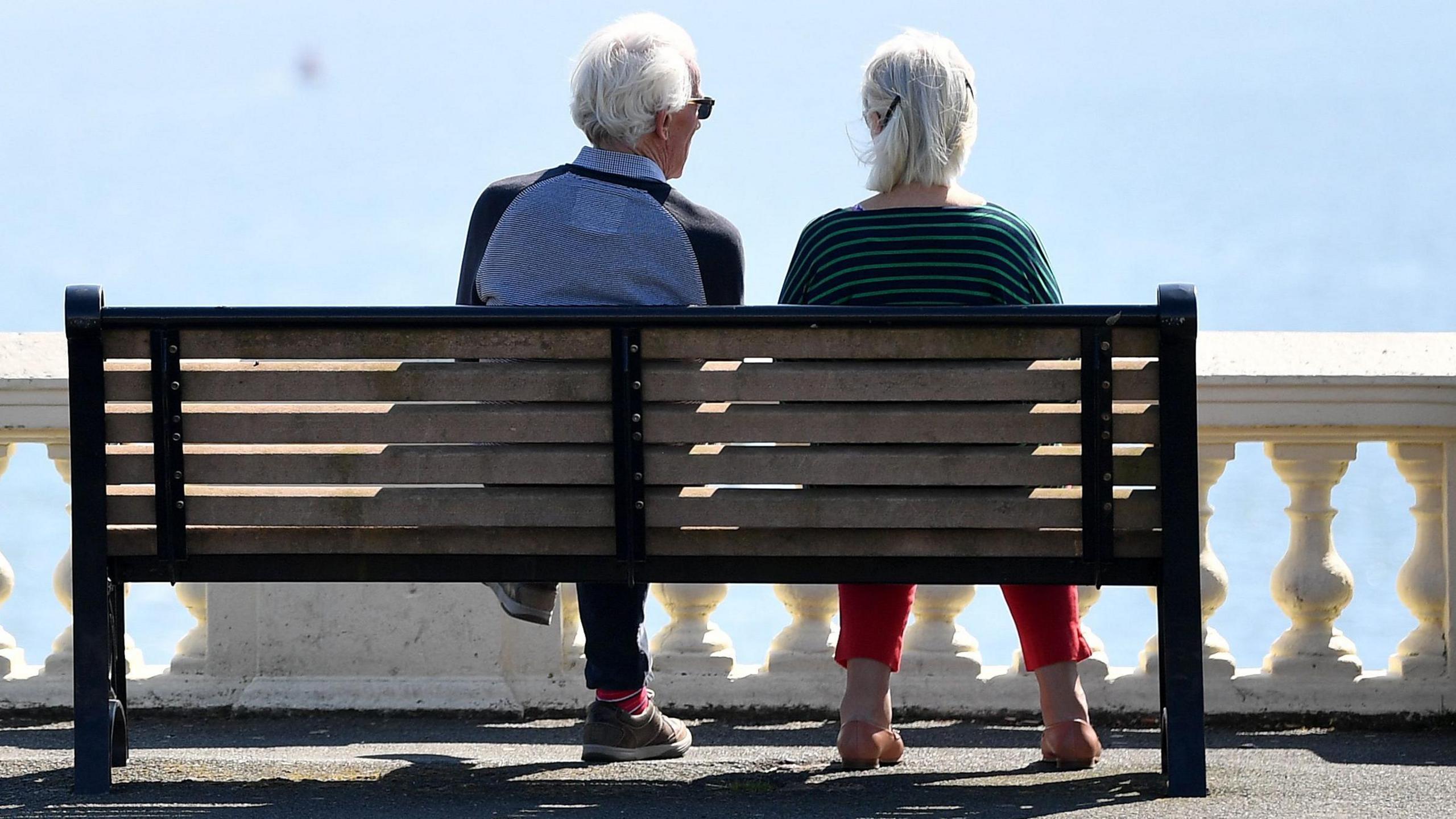Tories pledge 'Triple Lock Plus' pension allowance

- Published
The Conservatives have promised to raise the tax-free pension allowance via a "Triple Lock Plus" if they win the general election.
Under the plans, the personal allowance for pensioners will increase at least 2.5% or in line with the highest of earnings or inflation.
Prime Minister Rishi Sunak said the scheme "shows we are on the side of pensioners," who the Tories say will save £275 by 2030.
Labour said the government's plan was not "credible".
Pensioners' fears over paying income tax
- Published24 April 2024
At the moment, the state pension already rises in line with whichever is the highest - average earnings, inflation or by 2.5%.
This meant in April the state pension rose by 8.5%.
Both the Conservatives and Labour are committed to keeping the policy, designed to ensure pensions keep up with rising prices and wages.
But currently income tax thresholds have been frozen since 2021 - the independent watchdog, the Office for Budget Responsibility (OBR), has estimated, external that will create 4m extra taxpayers by 2028 and take 3m into the higher rate of tax.
Income tax is paid on money received via pensions.
By 2027, the state pension is expected to be higher than the tax-free personal allowance according to the OBR.
That would mean many millions more pensioners paying income tax, according to the Tories.
Charities have been reporting heightened concern among pensioners who fear being dragged into paying income tax.
Both Age UK and Independent Age saying they have seen an increase in calls to their helplines in recent weeks from pensioners confused about the issue.

Under the new scheme, the state pension will always be below the tax-free threshold.
The Conservatives claim the plans will cost £2.4bn a year by 2029-30, funded by the previously announced strategy to raise £6bn annually through improving tax collection and cracking down on tax avoidance and evasion.
A similar policy existed in the past but was scrapped by former Conservative chancellor George Osborne.
Speaking to the BBC Radio 4's Today programme, Paul Johnson from the IFS public spending think tank said the cost of the policy was "not a very big number, but these promises are beginning to add up.
"What this is, is a demonstration of priorities, and the priority is to take a few hundred thousand pensioners out of income tax."
Mr Sunak said: "I passionately believe that those who have worked hard all their lives should have peace of mind and security in retirement.
"Thanks to the Conservatives' Triple Lock, pensions have risen by £900 this year and now we will cut their taxes by around £100 next year.
"This bold action demonstrates we are on the side of pensioners. The alternative is Labour dragging everyone in receipt of the full state pension into income tax for the first time in history."
Shadow chancellor Rachel Reeves called the scheme a "desperate gimmick".
"The only reason that pensioners are looking for the first time at paying income tax on their basic state pension is because the Conservatives lost control of the economy," she told reporters.
Lib Dem Treasury spokeswoman Sarah Olney said: "The Conservative Party has hammered pensioners with years of unfair tax hikes and broken their word on the triple lock.
"People won't be fooled by yet another empty promise from Rishi Sunak after this record of failure."
What are the calculations?
Currently, there’s a freeze until 2027-2028 in the personal tax allowance at £12,570 a year – the amount you can earn before you must pay income tax.
That freeze, put in place by Mr Sunak and Mr Hunt, is effectively a tax rise because as people’s incomes grow with inflation - because their wages go up - more of what they earn exceeds the personal allowance and can be taxed.
And this was set to include some people receiving the new state pension. It’s currently around £11,500 a year, but in 2028 is expected to rise to £12,578, slightly above the level of the personal allowance of £12,570.
It will continue rising above the minimum tax threshold from then on.
So the Tories are proposing that the personal allowance rises to around £13,000 for pensioners from 2025 and keeps going up.
The independent Institute for Fiscal Studies (IFS) think tank has pointed out that this is not so much a tax cut as a means to prevent pensioners from being hit by a tax rise that is already happening.
The IFS estimates a third of pensioners, those on the old state pension or with limited UK work history, won't see any tax relief under the scheme.
The average pensioner could benefit by £300 a year, but low-income pensioners won't fare as well.
Analysis by BBC Head of Statistics Robert Cuffe found someone on the state pension alone will only save £29.40 a year by 2030.